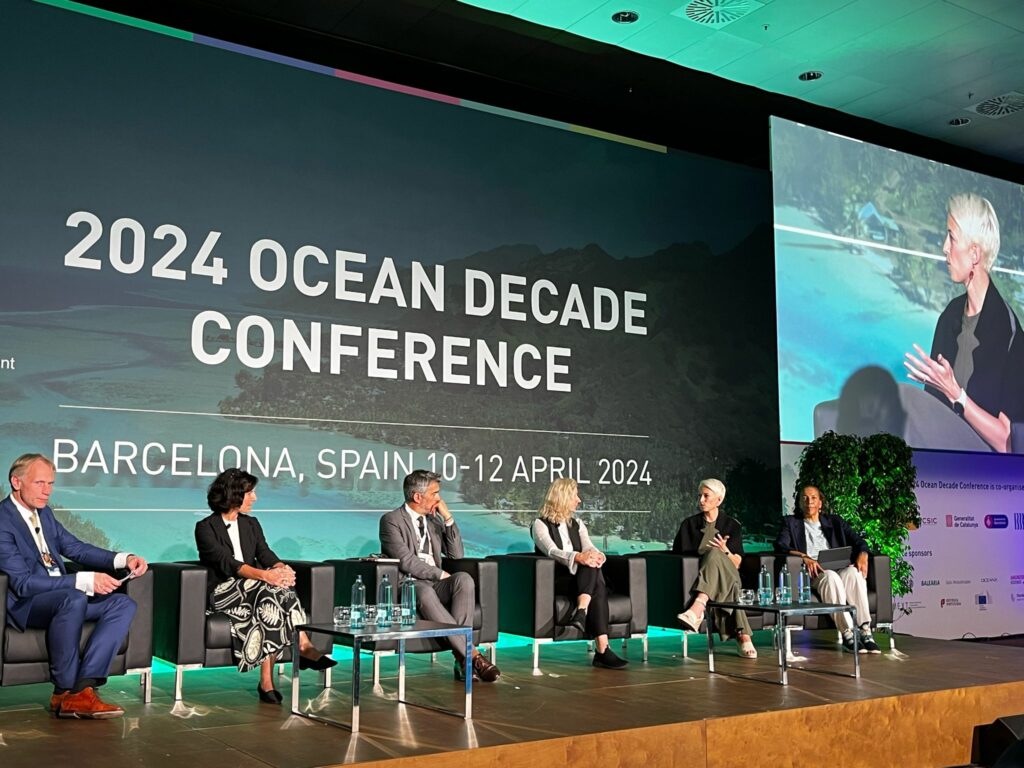The 2024 Ocean Decade Conference in Barcelona, from April 10 to 12, gathered over 1,500 participants from 124 countries. It formed part of a week of ocean-themed satellite events and meetings. Expanding the global ocean observing system is one of the core Ocean Decade challenges, and the gathering served as a pivotal moment for the global community to assess priorities to reach by 2030.

Challenge 7 – Expand the Global Ocean Observing System
A highlight event for the ocean observing community during the Ocean Decade Conference was the plenary on Science and Solutions for a Safe and Predicted Ocean, followed by dedicated sessions on Ocean Decade Challenge 7.
Ann-Christine Zinkann, representing the GOOS Ocean Observing Co-Design programme, served as one of the panelists at the plenary session. Zinkann emphasized the critical role of co-design in establishing a transformative and solutions-oriented ocean observing system: “The flagship GOOS UN Ocean Decade Ocean Observing Co-Design programme aims to evolve the ocean observing system so that it is co-designed with observing, modeling and key user stakeholders to be truly responsive and agile to user needs, and integrated along the value chain.” Essential Ocean Variables were also highlighted as a critical framework to prioritize observations and advance the observing system.
Patricia Miloslavich, Co-Chair of the Challenge 7 Working Group, emphasized the need to develop and expand the workforce: “We need a lot of people who will actually work throughout the ocean information value chain”. An important role in developing the workforce is played by the Early Career Ocean Professional (ECOP) programme, which the panelist Ann-Christine Zinkann forms part of.
The parallel sessions, led by Vision 2030 Working Group 7 Co-Chairs Joe O’Callaghan and Patricia Miloslavich, delved into the key recommendations outlined in the Challenge 7 White Paper. Key themes that emerged during the discussions included: identifying priority areas to expand ocean observations, emphasizing attainable goals while simultaneously tackling complex issues, forging diverse partnerships across sectors (including the private sector), strengthening the system through optimizing and harmonizing observations across platforms, and expanding and diversifying the workforce.
Explore the Ocean Decade Vision 2030 Challenge 7 White Papers and learn more here.

Ocean observing events across Ocean Decade Week
GOOS co-organized or participated in several side events on ocean observing during the Ocean Decade Week. A satellite event on technologies in sustainable ocean observations was co-organized by NOAA, GOOS, Marine Technology Society (MTS), AtlantOS and GEORGE projects, bringing together different stakeholders to discuss and elevate the challenges and opportunities in this area. The event presented the recently published Dialogues with Industry Roadmap, which provides action pathways towards a mature and vibrant Ocean Enterprise.
Several events led by the GOOS Ocean Decade programmes also took place during the Ocean Decade Week. The CoastPredict General Assembly brought together different projects that contribute to the programme and gathered support for the recently launched GlobalCoast initiative – a central framework for the coordination and practical implementation of the CoastPredict Programme. A side event “Coastal Futures: Charting Priorities for Resilience”, publicly launched the GlobalCoast initiative and showcased an ambitious collaboration between the initiative’s 125 Pilot Sites, private and public sector programme partners, towards establishing an integrated coastal ocean observing and predicting system.
The GOOS Ocean Observing Co-Design programme led an event on co-designing ocean observing for the tropics, which included an interactive session enabling participants to interact directly with the Co-Design Exemplar Projects in a ‘speed dating’ format. This established new global connections and collaborations for the Exemplars as they develop implementation pilot sites.
Barcelona Statement: Takeaway message for ocean observing
The first in-person Ocean Decade gathering was a truly inspirational moment for the global ocean community. The multitude of events and discussions during the Ocean Decade Week generated new conversations and partnerships. The Decade has a truly inclusive stance and is shifting the dial on ocean data access for Small Island Developing States, Least Developed Countries, and Africa, as well as embracing indigenous perspectives.
Most importantly, the conference was concluded in a critical roadmap for the coming years – the Barcelona Statement, unveiled during the closing session by Vidar Helgesen, Executive Secretary of the Intergovernmental Oceanographic Commission and Assistant Director-General of UNESCO, who highlighted the need for investment in priority ocean science infrastructure including ocean observations and data:
“The Conference discussed and identified priority ocean science infrastructure needs including for marine pollution monitoring, ocean observations, interoperable ocean data and for the enhanced use of adapted, innovative technology to underpin the equitable generation, access, and use of observations, data, and knowledge across all Ocean Decade Challenges, and by all nations.’’
Continued commitment and innovation are crucial to address the growing societal demands and ensure the sustainability of ocean observing efforts. As the global hub for ocean observing expertise, GOOS remains dedicated to lead the advancements in the development of a sustained, co-designed global ocean observing system that will ensure a safer and more predictable ocean for generations to come.
